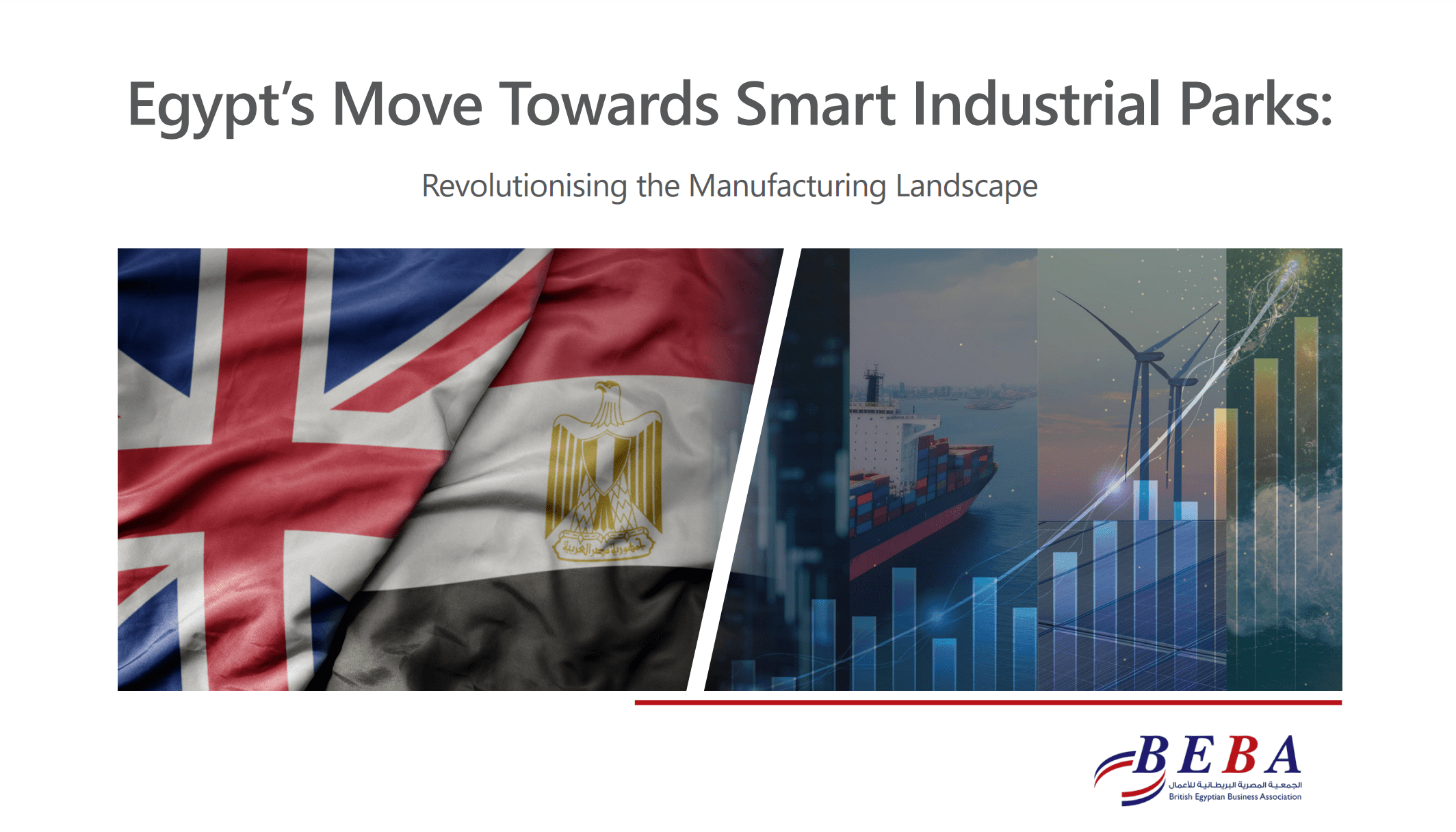
BEBA Annual Business Mission to the UK- September 18-20, 2024
Egypt’s industrial sector is on the brink of a transformative era with the emergence of smart industrial parks—cutting-edge spaces
that prioritise sustainability, integration, resource efficiency, and waste reduction. These parks represent a significant evolution from
traditional industrial zones, offering a more technologically advanced and eco-friendly environment for manufacturing. But what
exactly makes these parks “smart,” and how might they reshape Egypt’s manufacturing landscape?
The Rise of Smart Industrial Parks
Smart industrial parks, akin to smart cities, are constructed on the pillars of advanced technology and sustainability. Developers such
as the Industrial Development Group (IDG), Polaris Parks, and the Suez Industrial Development Company (SIDC) are leading the way
in incorporating smart features into their parks. These innovations range from state-of-the-art infrastructure to Industry 4.0 support
systems that enhance manufacturing processes, ensuring these parks are not just places of production but hubs of innovation.

Public Sector Interest and Support
The shift towards smart industrial parks has garnered significant interest from the public sector. The Egyptian Ministry of Trade and Industry, in collaboration with the United Nations Industrial Development Organization (UNIDO), is spearheading efforts to develop eco-industrial models that other parks across Egypt can replicate. This initiative, backed by EUR 1.5 million in funding from the Swiss government, will begin with the Suez Canal Economic Zone (SCZone), where SIDC is located, marking the initial phase of this industrial transformation.
What Sets Smart Parks Apart?
A distinguishing feature of smart industrial parks is their advanced infrastructure. For instance, IDG’s e2 Alamein park employs cutting-edge technologies that detect and address issues across the park in real time, all without disrupting ongoing operations. This type of infrastructure not only boosts efficiency but also minimises downtime, making these parks highly attractive to manufacturers looking for a competitive edge.
The Role of Technology
Technology plays a pivotal role in defining a park as “smart.” These parks leverage information and communication technology (ICT) to optimise operations, from high-speed internet connectivity to automated flood management systems. Polaris Parks, for example, has integrated technologies such as security cameras, LED lighting, and water-saving flood management systems to enhance efficiency while reducing resource waste.
Osman Evren Arikan, Managing Director, Polaris Parks, emphasised
this by stating, “Egypt’s industrial transformation should be driven by
the integration of advanced technologies and sustainable practices. Unlike
traditional manufacturing zones, today’s industrial parks are enhancing
infrastructure efficiency, minimising environmental impact, and optimising
supply chain integration—crucial elements for positioning Egypt as a
competitive force in the global industrial landscape. Private industrial parks
are pivotal in this evolution. As developers, we are making substantial
investments in cutting-edge infrastructure to attract global investment and
set new industry benchmarks. By leading the charge towards Industry 4.0,
we are shaping a future where Egypt’s industrial sector is smarter, more
sustainable, and better equipped to meet the challenges of tomorrow.”

Supply Chain Integration and Industrial Symbiosis
Smart parks excel in supply chain integration, functioning as ecosystems where industries can collaborate by sharing infrastructure, services, and even by-products. This concept, known as industrial symbiosis, allows one factory’s waste to serve as another’s raw material, thereby reducing both costs and waste generation. In IDG’s East Port Said parks, industrial clustering—where feeder industries and factories working towards a common product are grouped together—further enhances manufacturing efficiency and fosters a collaborative industrial environment.
Environmental and Economic Benefits
The environmental benefits of smart industrial parks are substantial. By reducing waste and optimising resource use, these parks significantly lower the carbon footprint of manufacturing—an essential factor as Egypt seeks to attract foreign investment and boost exports. Additionally, the integration of Industry 4.0 technologies, such as automated equipment and data analysis, further reduces emissions by enhancing efficiency across the board. Contrary to popular belief, transitioning to smart, eco-friendly technologies is not always prohibitively expensive. Many of the necessary systems, such as alert software and sensors, are cost-effective, and the shared ecosystem of a smart park helps distribute maintenance costs among manufacturers, making these innovations more accessible.

Investment in Infrastructure
However, it’s important to recognize that developing the digital infrastructure for smart parks requires substantial investment. For instance, IDG is committing approximately EGP 300 million over five years to establish the necessary infrastructure. These investments are expected to yield significant returns by facilitating the broader adoption of Industry 4.0 technologies and propelling Egypt’s industrial sector towards a more sustainable and efficient future.
The Future of Industry in Egypt
As Egypt continues to develop its smart industrial parks, these advanced hubs are poised to accelerate the country’s shift towards Industry 4.0. By serving as platforms for automation and data-driven manufacturing, smart parks will not only enhance productivity but also position Egypt as a competitive player in the global industrial landscape. For those interested in gaining deeper insights into Egypt’s burgeoning industrial sector, the upcoming British Egyptian Business Association (BEBA) mission to the UK will provide a platform where key stakeholders can discuss these advancements and explore future opportunities. The rise of smart industrial parks in Egypt marks a significant leap forward in the country’s industrial evolution. By embracing technology, sustainability, and integration, these parks are setting new benchmarks for efficiency and environmental responsibility. As more developers and government bodies join this movement, smart industrial parks could very well become the cornerstone of Egypt’s manufacturing future. Stay tuned for further updates from the BEBA mission to the UK, where these groundbreaking developments will be explored in greater detail.
